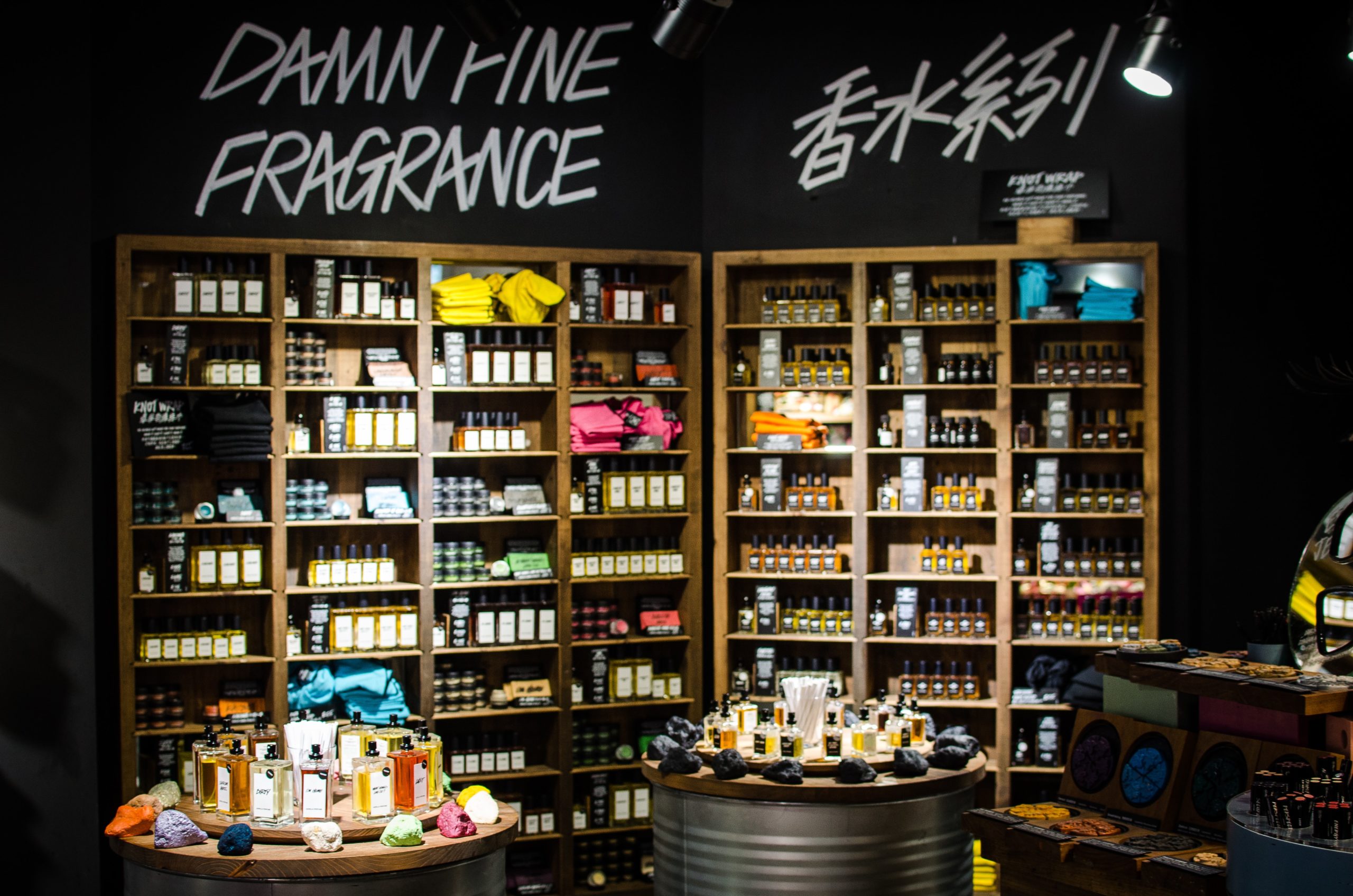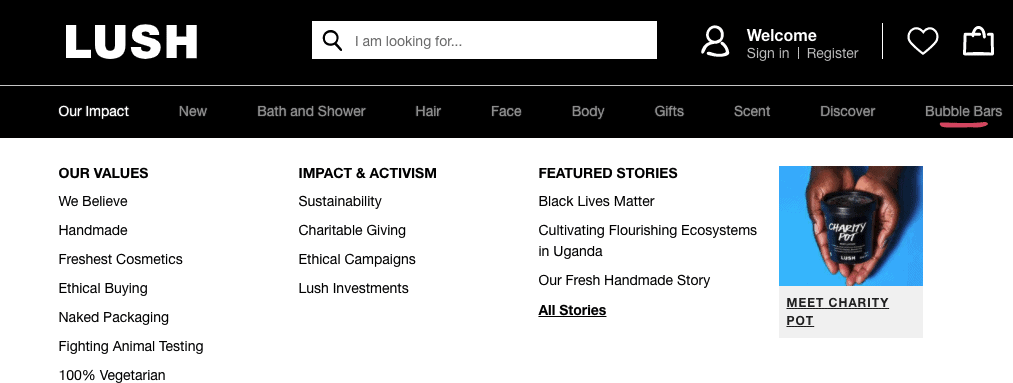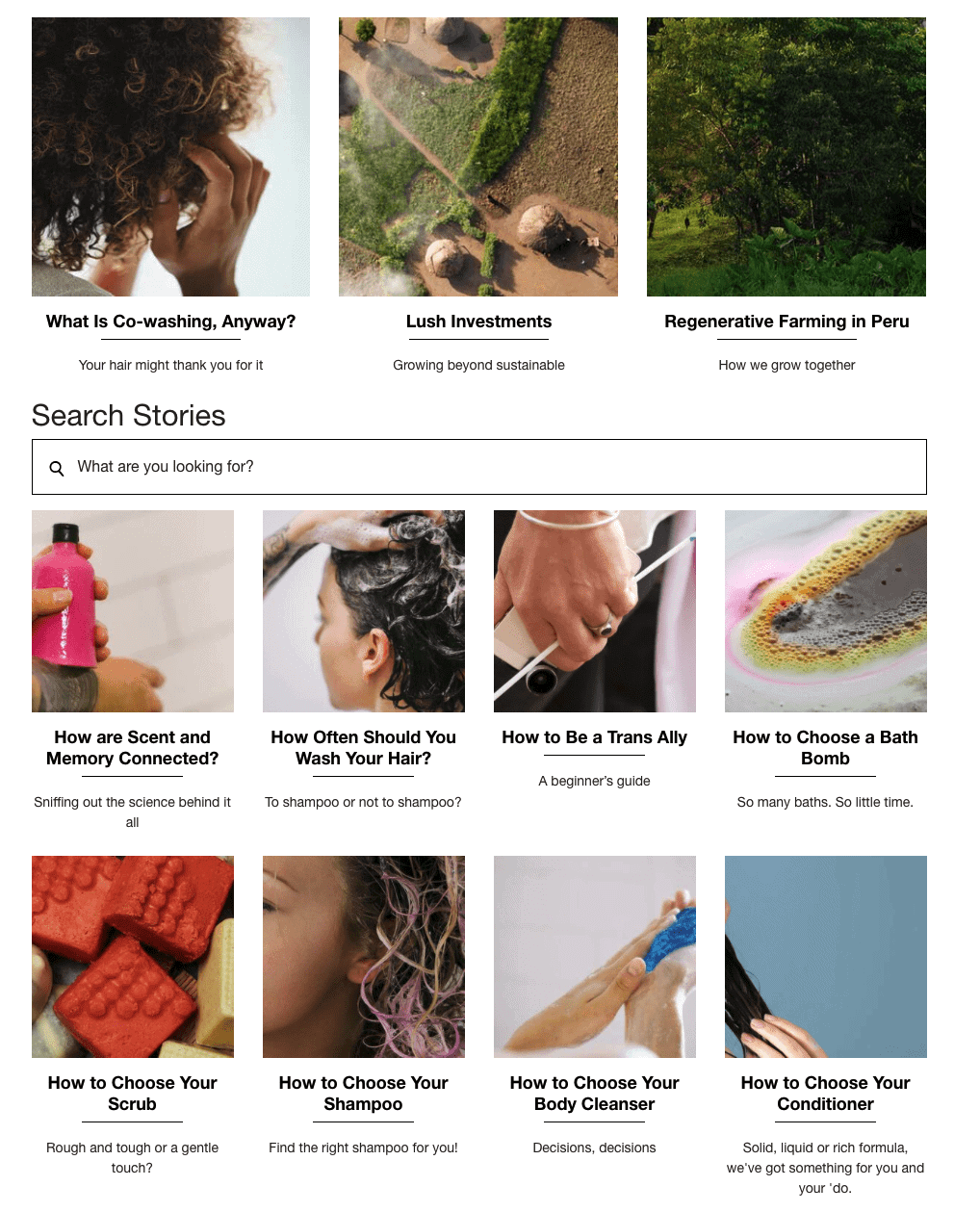How a Bath Bomb Store Made a Splash in Marketing

Lush Cosmetics- perhaps best known for their impressive range of bath bomb options- rose to prominence as a socially aware, sense-awakening “naked” cosmetics company rooted in turning the process of self-care and hygiene products on its head. Their simple, stripped-down branding featuring a monochromatic palette contrasts sharply with the barrage of colors and scents that welcome you into their retail stores and manage to pop out on the recycled-paper pages of their mailers.
From Bath Bombs to Big Bucks
Over its 25 years in business, this self-care mecca grew from a small cult following into a powerhouse in the world of bath products. As of February 2020, they have 446 stores across the globe and a total turnover of $545 million.
So, what did this company do to make such a name for themselves?
When it comes to marketing, Lush has taken an interesting approach to what we understand as “good marketing practices.” Brands tend to focus on the “how” of marketing- the social media sites they’ll be active on, the types of posts they’ll create, and which audiences they are planning to target. Lush, on the other hand, focused on the “why,” and continue to let their values drive every decision they make in their marketing strategy.
Let’s explore a few key points of Lush’s branding, then dive into NATIV3’s key takeaways that we can learn from this bath bomb empire.
Unabashed Pride in Their Social Stances
When you visit Lush’s website, one thing that stands out is that their site navigation menu starts with “Our Impact,” which includes topics like their core values, the causes that they stand behind, and featured, long-form content about those particular topics. Compared to most e-commerce sites, that’s pretty unusual. Typically, you’ll see options to view the newest products, latest updates, and the like. But, backing up their stance that they’re more focused on principles than profits, Lush focuses on social stances before they start showcasing products.

This approach to their branding and marketing greatly appeals to the particular demographics they’re focused on:
“Consumers [that] have knowledge of environmental, sustainability, and animal right issues… Looking for an ethical lifestyle, looking for new ways to consume, looking for novelty, looking for natural and quality product good for his/her health… Customers attracted by the quality of the products: made hands with natural products and fresh without chemical product… Customers attracted by the committment against the exploitation of animals… vegetarian, vegan, not test[ed] on animals… Customers attracted by the environmental and ecological[ly] friendly aspect of the brand…”
Lush falls right in line by practicing what they preach, and the proof can be seen all over the web. Below are just a few of the many, many examples on ways that Lush actively participates in their chosen values:
Human Rights
- Ceasing partnerships with companies that allow child and forced labor in materials mining operations
- After learning that mica mines in India were not regulating their practices, including the use of child labor, Lush made the decision to switch to a synthetic version of this sparkly mineral to eliminate any chance of doing business with sites that utilized minors in their operations.
- Abolition of the death penalty
- Lush partnered with Death Penalty Focus, launching a campaign that supported the abolition of the death penalty. The beauty brand’s involvement included awareness events that asked communities to get informed and get involved in eliminating capital punishment. Additionally, they released an almond-scented bath bomb called “31 States” to call attention to the 31 states that still practice the death penalty. 100% of proceeds were donated to help organizations also aligned with the cause.
Animal Rights
- Fighting Against Animal Testing
- Lush utilizes no animal testing and actively protests against its use across the beauty industry. Their “Fighting Animal Testing” page states, “Fighting animal testing is more than just a slogan, it’s a genuine practice. For more than three decades, we’ve been fighting against animal testing. Lush was founded on the firm belief that animal testing is cruel, inaccurate and unnecessary, and the founders of the business have dedicated their careers to eliminating animal testing in cosmetics.?Lush has the strictest non-animal testing policy in the cosmetics industry. We only buy ingredients from suppliers that don’t conduct or commission tests on animals for any reason and we audit them annually to ensure they meet the standards of our policy. When we develop new products, we only test them on human volunteers. As a result, we?can proudly say that all Lush products are 100 percent cruelty-free and never tested on animals”
- Charity Pot product
- With every purchase of Lush’s Charity Pot floral-scented body lotion, 100% of the price is donated to “small grassroots organizations working in the areas of human rights, animal protection, and environmental justice.”
Sustainability
- “Naked” products
- To fight for better sustainability practices in the beauty industry, Lush created “solid products,” like bubble bars, shampoo, conditioners, and massage bars that eliminate the need for packaging. According to their site, “Since 2005, we’ve sold more than 41 million shampoo bars, saving 124 million plastic bottles from ever being produced. That’s approximately 3417 tons of plastic saved, or about the weight of 30 blue whales.”
- Ecosystems in Uganda
- Lush has been investing in regenerative farms in Uganda since 2014. Regenerative farming is the practice of restoring land during the production of product ingredients, with the goals of planting trees, providing a sustainable economic system in war-torn Gulu, and creating microclimate agroforests that regulate their own water, soil fertility, and animal habits while providing natural ingredients for manufacturing.
The values that they’ve chosen to focus on- handmade, freshest cosmetics, ethical buying, naked packaging, fighting animal testing, and 100% vegetarian- are backed up thoroughly by their public presence in the causes they’re involved in. One of the most critical trends we’ve seen in marketing is more consumer emphasis placed heavily on brand authenticity. A 2018 article from AdWeek titled “Brands Unwilling to Commit to a Set of Values Risk Losing Consumers” summarizes that despite brands meeting all fundamental needs of their audiences, “… that isn’t enough for world-wise Gen-Z and millennial changemakers who are eager to be active participants in bettering our world.”
Transparent, Open Practices
There’s been a long history of companies making false claims in order to ensnare people into buying products that go against consumer values. In fact, it’s so prevalent that there’s a word for it- “Greenwashing.” Truth in Advertising, an organization offering resources and information that helps consumers make informed purchasing decisions, defines it as a practice in which “ads make something sound better for the environment than it actually is.” In fact, on April 19th, they released an updated 2021 list of companies accused of Greenwashing, including Charmin, Nature’s Own, Mercedes-Benz, and dozens more.
In Lush’s favor is the fact that a) they were absent from the list and b) they’ve received recognition as “Transparency Trailblazers.” This, again, aligns with their commitment to giving their consumers backdoor access to their company practices, further aligning them as a trustworthy company in a marketing landscape that has a keen nose for phonies.
About Lush and their status as a Transparency Trailblazer, marketing company PCR stated:
“LUSH is a company that strives to continuously develop ethical practices, create humane cosmetics, and maintain positive relationships with like-minded people. Making profit is obviously a priority for any enterprise, but LUSH sees it as second thought in comparison the the vast list of global causes that it supports. People will continue to buy from LUSH not because their facial scrubs are moderately priced or because they smell good, but because of what they stand for.”
Powerful, Creative Content Strategy
Perhaps even more powerful than Lush’s commitment to their values is their commitment to content marketing. We’ve pushed long-form content marketing time and time again, discussing its value as both a tool in SEO and SEM practices and as an undeniable draw for the curious consumer to learn more about your business in an organic, authentic way.
On their website, the Stories page (which is also part of their first navigation menu option) serves as their blog. Their long-form content features a mix of cause-based information that promotes the values we discussed earlier, informative articles on topics spanning the beauty and bath industry, and more direct marketing entries that reinforce their commitment to innovation.
Companies could learn a thing or two from this dedication to writing. Many businesses think that long-form content is just a bid to hit higher rankings on search engine results pages, but in reality, it’s a gift to your audience. It provides information and entertainment on the topics you know that they’re interested in simply by the fact that they’re on your website. Lush has made the conscious choice to focus on blog articles that shift the focus from “You should buy our products!” to “Here’s how our products can help you live the life you want to live, but even if you’re not ready to purchase, we offer resources on things you care about.” It’s a Herculean effort, as all great content requires passion, time, and skill to create, but it’s one that continues to serve them well for a quarter of a century.

Lush ups the ante with gorgeous products that create swoon-worthy photo-ops then takes it another step further by echoing user content in their own marketing efforts.
About the practice, Sabine Schwirtz, Community Manager of Lush Cosmetics North America said,“User-generated content is a great way for us to produce larger quantities of content that performs really highly and engages our community. Our consumers are giving us exactly what they want to see. It’s important that we’re listening to those needs and providing what they want.”
Instead of investing their marketing budgets into huge, fancy campaigns, they reached out to their community of Lushies, enticing them to share their love of bath bombs, bubble bars, and body butters across social media. It’s allowed them to move away from costly, curated photoshoots and product launches, and instead places the power in the hands of the people that use the products. The community has responded with gusto, leading Lush to adapt their entire marketing strategy to effectively and efficiently showcase user content across all of their platforms.
There’s also an added benefit of users creating the exact content they want to see. Essentially, they’re marketing to themselves using the content that they know for a fact that their customers want to see… because their customers are the ones that made it.
Great Marketing is Tough… NATIV3 Makes It Easier
We can’t all be Lush, but NATIV3 can help you create marketing campaigns that are the (bath) bomb! Let us walk you through our ideas for revamping your long-form content, social media, and search engine marketing strategies with data-driven insight and decades of combined experience. NATIV3 is ready to change your business marketing for the better! Are you?